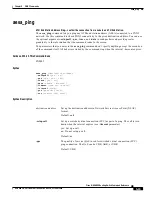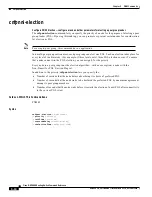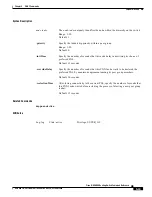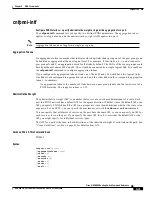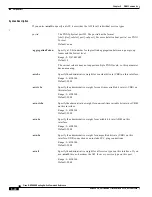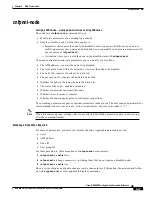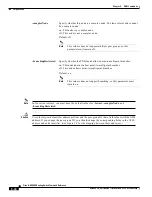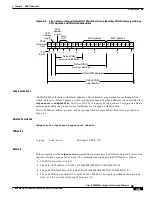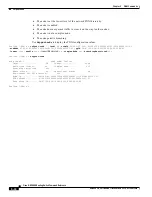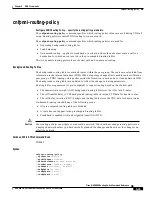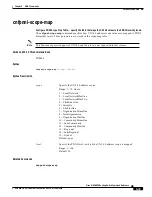
5-27
Cisco MGX 8850 Routing Switch Command Reference
Release 2.0, Part Number 78-10467-04 Rev C0, October 2001
Chapter 5
PNNI Commands
cnfpnni-node
cnfpnni-node
Configure PNNI Node
—
modify parameters for an existing PNNI node.
The node-level cnfpnni-node command lets you:
•
Modify the parameters of an existing logical node.
•
Enable or disable a node. This ability applies to:
–
Parameters that require the node to be disabled before you can modify them (if you do not
modify parameters that require a disabled node, you can modify one or more parameters with
one execution of cnfpnni-node).
–
A situation where you created the node in the disabled state with addpnni-node.
The node configuration and state parameters you can modify are as follows:
•
The ATM address—requires the node to be disabled
•
The level of the node within the hierarchy—requires the node to be disabled
•
The node ID—requires the node to be disabled
•
The peer group ID—requires the node to be disabled
•
Whether the node is the lowest node in the hierarchy
•
The state of the node—enabled or disabled
•
Whether connections can transit this node
•
Whether or not the node is complex
•
Whether the node supports point-to-multipoint connections
The preceding parameters appear as optional parameters in the syntax. The only required parameter for
this command is the local node index. In the current release, the only node index is “1.”
Note
When this command runs, existing calls are not affected. Modified parameters apply to new routing
after the command finishes.
Disabling a Node When Required
For some of parameters, you must first disable the node. Applicable parameters are the:
•
Level
•
ATM address
•
Node ID
•
Peer group ID
For these parameters, three executions of cnfpnni-node are necessary:
1.
cnfpnni-node -enable false
2.
cnfpnni-node (change parameters, including those that do not require a disabled node)
3.
cnfpnni-node -enable true
Be sure to synchronize applicable changes (such a change in level) throughout the network and follow
up with dsppnni-node or other applicable display commands.



